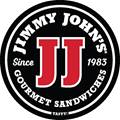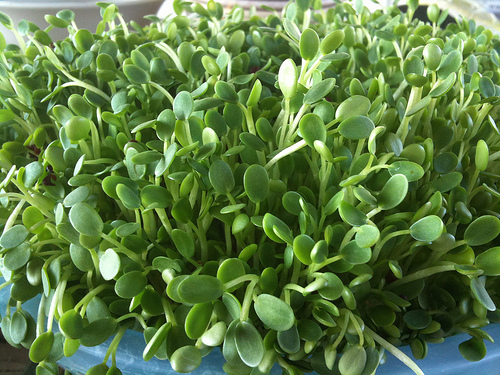Remember when Jimmy John’s, the sandwich favored by university faculty department meetings and college students across the U.S., sickened hundreds of people across the U.S linked to raw alfalfa sprouts so they switched to raw clover sprouts and made more people sick?
Chris Koger of The Packer reported in late Dec. 2019 that Sprouts Unlimited, Marion, Iowa, is recalling clover sprouts, which have been linked to a cluster of E. coli cases under investigation in Iowa.
The Iowa Department of Inspections and Appeals is investigating the link between the outbreak and the product from Sprouts Unlimited, according to a Dec. 27 recall notice from the company.
The sprouts were shipped to Hy-Vee and Fareway Foods stores, and Jimmy John’s restaurants.
The retail packs in the recall are in pint containers with a blue label on the lid, according to Sprouts Unlimited. The Universal Product Code is 7 32684 00013 6 is on the bottom right side of the label.
 The Iowa Department of Inspections and Appeals told Sprouts Unlimited the sprouts are epidemiologically linked to the outbreak. More tests are being conducted to determine the source, according to the recall notice.
The Iowa Department of Inspections and Appeals told Sprouts Unlimited the sprouts are epidemiologically linked to the outbreak. More tests are being conducted to determine the source, according to the recall notice.
We document at least 55 sprout-associated outbreaks occurring worldwide affecting a total of 15,233 people since 1988. A comprehensive table of sprout-related outbreaks can be found here.
Failures in sprouts-related risk communication
Food Control.2012. 10.1016/j.foodcont.2012.08.022
Erdozain, M.S., Allen, K.J., Morley, K.A. and Powell, D.A.
http://www.sciencedirect.com/science/article/pii/S0956713512004707?v=s5
Nutritional and perceived health benefits have contributed to the increasing popularity of raw sprouted seed products. In the past two decades, sprouted seeds have been a recurring food safety concern, with at least 55 documented foodborne outbreaks affecting more than 15,000 people. A compilation of selected publications was used to yield an analysis of the evolving safety and risk communication related to raw sprouts, including microbiological safety, efforts to improve production practices, and effectiveness of communication prior to, during, and after sprout-related outbreaks. Scientific investigation and media coverage of sprout-related outbreaks has led to improved production guidelines and public health enforcement actions, yet continued outbreaks call into question the effectiveness of risk management strategies and producer compliance. Raw sprouts remain a high-risk product and avoidance or thorough cooking are the only ways that consumers can reduce risk; even thorough cooking messages fail to acknowledge the risk of cross-contamination. Risk communication messages have been inconsistent over time with Canadian and U.S. governments finally aligning their messages in the past five years, telling consumers to avoid sprouts. Yet consumer and industry awareness of risk remains low. To minimize health risks linked to the consumption of sprout products, local and national public health agencies, restaurants, retailers and producers need validated, consistent and repeated risk messaging through a variety of sources.




.jpg) Wash. as the source of a separate salmonella outbreak that has sickened three in Oregon and four in Washington. Once again, the vehicle in at least some of the illnesses was Jimmy John’s sandwiches with sprouts.
Wash. as the source of a separate salmonella outbreak that has sickened three in Oregon and four in Washington. Once again, the vehicle in at least some of the illnesses was Jimmy John’s sandwiches with sprouts..jpg) clean, than alfalfa sprouts, and that to the best of his knowledge, not one case of salmonella carried by alfalfa sprouts can be traced to one of his restaurants.
clean, than alfalfa sprouts, and that to the best of his knowledge, not one case of salmonella carried by alfalfa sprouts can be traced to one of his restaurants. best tasting sprouts available. We pride ourselves in the quality of our product while strictly adhering to all local, state, and federal regulations and guidelines.”
best tasting sprouts available. We pride ourselves in the quality of our product while strictly adhering to all local, state, and federal regulations and guidelines.” —Deli sprouts in 4 oz. (UPC 8 79566 12305 4) and 5 oz. (UPC 0 33383 70267 4) containers.
—Deli sprouts in 4 oz. (UPC 8 79566 12305 4) and 5 oz. (UPC 0 33383 70267 4) containers.